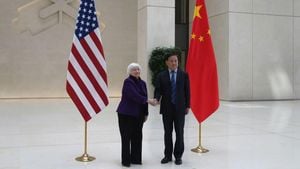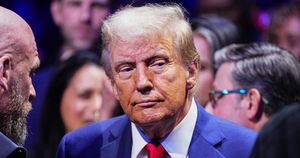Elon Musk, the entrepreneur known for his work with Tesla and SpaceX, finds himself at the center of controversy once again. This time, the storm revolves around his much-discussed hosting stint on Saturday Night Live (SNL) back in 2021, which has resurfaced nearly three years later thanks to the candid comments of SNL cast member Chloe Fineman.
Fineman, during a now-deleted TikTok video, shared her emotional experience of working with Musk, claiming he made her "burst out crying" when he dismissed her skit suggestions with harsh critiques. "I was so excited, I came in, I asked if you had any questions and you stared at me like you were firing me from Tesla," she recounted, describing how Musk told her flatly, "It’s not funny," without any intention of softening the blow.
According to Fineman, Musk went even farther by flipping through her script, announcing, "I didn’t laugh once, not one time," as if systematically undermining her creative efforts. These comments paint Musk as not just the tech mogul with millions of followers but also as someone who apparently lacks the sensitivity one might expect from someone working on comedy sketches.
Bowen Yang, another SNL cast member, had alluded to this incident months prior, mentioning during an interview on Watch What Happens Live about how multiple cast members were left emotional due to one male host’s unfavorable feedback on their sketch ideas. While he did not name Musk at the time, the wheels began to turn when Fineman's dramatic recounting steered the conversation back to the infamous episode.
The portrayal of Musk as the cast member who made several of his peers cry struck the humor community quite oddly. After all, he is known for his quick wit and brash honesty when it counts, yet the depths of his mockery during the SNL preparations had remained largely hidden until now. Musk, typically appearing unfazed, doesn’t shy away from criticism; he often writes about what he thinks on his preferred social platform, X (formerly Twitter). Following the dramatic TikTok response from Fineman, Musk responded, noting how worried he was leading up to the episode.
"Frankly, it was only on the Thursday before the Saturday when any of the sketches generated laughs," Musk expressed on X. He then humorously added, "I was like damn, my SNL appearance is going to be so fucking unfunny it will make a crackhead sober! But then it worked out in the end.” This strange analogy did nothing to dispel the character portrayal he was cementing with the humor community—an oddly cruel purveyor of comedy.
Recently, Musk has thrown shade at SNL—this came after veteran comedian Dana Carvey did his take on Musk during an episode hosted by Bill Burr just weeks ago. Musk didn't hold back, stating on X, "SNL has been dying slowly for years, as they become increasingly out of touch with reality.“ His unwillingness to view his own portrayal as simply comedy left many wondering: is this man, known for launching rockets and self-driving cars, really sensitive about comedic interpretations of himself?
Fineman finally decided to address Musk's comments after his social media critiques. "I saw some articles and stuff and I was like, 'I’m not gonna say anything.' But I’m like, ‘No.’ If you’re gonna go on your platform and be rude, guess what? You made I, Chloe Fineman, burst out crying!" She expressed her frustration over the overreaction Musk seemed to have exhibited, bringing comedic tension back to the team’s dynamics and showcasing the behind-the-scenes reality of hosting SNL.
The comedian later asserted, "But, you know, have a little manners here, sir,” reminding everyone, including Musk, how respect goes both ways—especially within the creative arena. Fineman did, admittedly, give Musk credit for being funny during his actual appearance on the show. "The sketch ended up being fine," she added, showing some grace amid the ashes of harsh criticism.
Musk's return to the SNL conversation may be perceived as bizarre, but his critique of Carvey’s impression along with his reflection on Fineman directly showcases how public figures navigate criticism and humor. The exchange remains layered, and viewers are left with more questions than answers. How accountable should guest hosts be for their contributions to comedy? Should Biden's administration and tech mogul cross paths within this hereditary display of perceived social correctness?
Fineman’s experience sheds light on the often-overlooked pressures faced by comedic actors and writers when dealing with celebrity hosts. Acting as both the creator and performer can bite back when one’s offerings aren’t appreciated. The underlying message remains clear: even when working among innovative minds like Musk, kindness and basic human decency should never take the back seat—especially when feelings are at stake.
The fallout from what may be termed the "Musk Cry Incident" highlights broader themes within SNL's comedic ecosystem, showcasing the clash between high-profile guests and the improvised chaos of live sketch comedy. While Fineman’s TikTok was deleted, the struggle remains within digital memory. How Musk navigates this as he continues to make headlines will, undoubtedly, shape the future tone of his public personas.
Still, artists, creatives, and tech moguls alike must engage constructively to maintain the artistry behind humor, rather than subdividing the community on their differences, lest they risk losing the essence of what comedy is meant to achieve—to entertain, to challenge, and to bring smiles. Certainly, Elon Musk should take heed!



